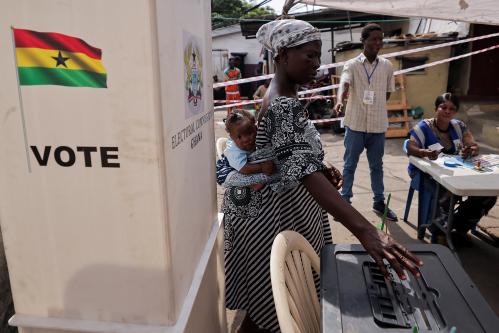

8:00 am EDT - 9:30 am EDT
Past Event
8:00 am - 9:30 am EDT
1775 Massachusetts Avenue N.W.
Washington, DC
20036
An informal roundtable to discuss the role of regional development banks (RDBs) in the new global development agenda was held at the Brookings Institution on October 7, 2016.
Several recent papers address the role of regional development banks in the new global agenda, including CGD’s High Level Panel report on multilateral development banks, the New Climate Economy report “The Sustainable Infrastructure Imperative”, and the report of the International Commission on Financing Global Education Opportunity “The Learning generation”. A background brief prepared by Brookings scholars was also shared with roundtable participants.
The reports have a common theme—they each lay out an imperative for action with multilateral banks at the heart of implementation of the new global agenda.
There is consensus that there is now a shared global agenda, with a need to innovate, scale up, partner with the private sector, and build capacity within countries to address their own development needs more forcefully.
This is a unique moment in history because of the opportunities to eliminate poverty and improve lives everywhere and because of the important transitions that are now underway. Urban populations will close to double in the next four decades and decisions taken in the next two decades will shape our patterns of production and consumption for decades to come. During the next 15 years we will be adding more infrastructure than the existing stock. We can make the new infrastructure and urban areas sustainable and attractive or lock in cities where we cannot move or breathe and that will take global temperatures to well above two degrees Celsius with all the consequential impacts and risks. It is also the last opportunity to seriously address the demographic transitions occurring in the developing world including in Africa, with all the implications that entails for migration, jobs, prosperity or frustration and anger. Delay in moving forward with actions on scale would be irresponsible and deeply dangerous given the lock-in of capital and technology and shrinking planetary boundaries including for carbon.
MDBs have a central role in catalyzing the scaling up of actions and financing that is needed to deliver on the 2030 development agenda and the ambitions of the Paris Agreement. Regional banks have a special role in the global agenda at this moment in time—they have developed specialized skills and have been in the forefront of innovation, they are trusted partners of client governments, and they are well equipped to facilitate implementation at scale, especially to support the immense needs for sustainable infrastructure. But these competencies are under-recognized and under-appreciated, and hence under-utilized. RDBs can also articulate their strategy more clearly than global institutions, and they have become the innovators within the MDB system. However, RDBs are constrained in their capacity to scale up and leverage their resources in part because of a lack of consensus amongst shareholders on their mandates and future directions.
A range of ideas for follow-up were discussed, including:

Amar Bhattacharya, Homi Kharas, Charlotte Rivard, Eleonore Soubeyran
June 30, 2025

Homi Kharas
June 30, 2025

Oscar Otele, Danielle Resnick, Landry Signé
June 25, 2025